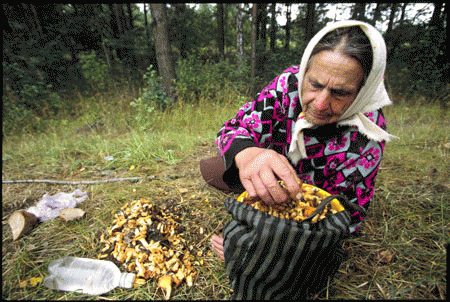The Nuclear Regulatory Commission continues to say that the levels of radiation coming from the nuclear power plants in the United States has no significant impact on the health of people in the area.
Large areas of Belarus were contaminated by the fallout from Chernobyl. Many of these places have low ambient radiation but the soil is contaminated with cesium. The government wants people to move back to the contaminated areas so it declared them clean and told people it was safe to move back. There is currently no program in place to test the food. One pediatrician I spoke with said that 90% of the children in her district have chronic health problems.
We don't really know how much radiation has leaked from Fukushima. Since the inside of the reactors are too hot for anyone to go inside, there is no way of knowing how many of the approximately 600,000 fuel rods were exposed to the air. We don't know how much has fallen with the rain. We don't know how much has been dumped in the ocean.
But the EPA assures us that they can take thirty samples of milk from all over the country, not even one for each state, once in three months and we'll have a good idea of the health impacts of the radiation from Fukushima.
Radiation doesn't fall evenly. Measuring one milk sample for an entire region is like saying you're going to find your New York City friend by standing in the middle of Time Square and asking exactly one person if they know where he is.
We need a realistic monitoring system with more than one station in each agricultural county. Measurements should be made on a frequent basis, especially when there is an active source of contamination, like Fukushima. Also, because a huge amount of contaminated water was dumped into the ocean all seafood needs to be tested. This is the only way we can be sure that the food is radiation free.
We also need a way of measuring the amount of radiation that has collected inside human bodies. We can guess how much radiation someone is ingesting based on food testing but how much has accumulated inside them depends on what types of food they've eaten and how much radioactive material they might have inhaled.
Fukushima is not over yet. There are more releases to come. There are more reactors and more earthquakes yet to come. Even if we decided tomorrow to close every single nuclear power plant in the world it would take a considerable amount of time to shut them down and replace them with something else. There will be more accidents. There will be more radiation. The government and the nuclear industry will continue to tells us there's nothing to worry about.
It won't be easy to get this going. The nuclear industry, both civilian power plants and military weapons plants, will fight it. The nuclear industry has a big voice. General Electric, which built about 32 percent of the 104 nuclear power plants still operating in the United States, owns television networks NBC and Telemundo, Universal Pictures, Focus Features, 26 television stations in the United States and cable networks MSNBC, Bravo and the Sci Fi Channel. GE also owns 80 percent of NBC Universal.
It will be an expensive proposition to set up a good food monitoring system but it is imperative if we want to prevent an epidemic of radiation related disease and death. I think we should take that $1.1 billion that GE received in "tax benefits" in 2010 and use it to set up independent research and monitoring of food safety.
(Note: You can view every article as one long page if you sign up as an Advocate Member, or higher).





